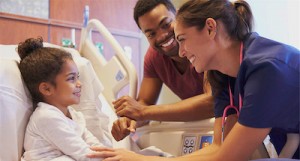Pediatric Surgery and Anesthesia Safety
 By Dr. Ashley McDonell, Providence Anesthesiology Associates
By Dr. Ashley McDonell, Providence Anesthesiology Associates
Whether your child’s upcoming procedure is elective or mandatory, we know that for many, the thought of surgery is scary.
For pediatric elective surgery, in children who are old enough to understand, we often explain that the administration process of general anesthetic is similar to flying an airplane:
- Takeoff — induction or “going to sleep”.
- Flying to a destination — the time during the actual surgical procedure.
- Landing — emerging from anesthesia in the recovery room.
Each of these three phases have specific safety concerns that are constantly monitored by your physician anesthesiologist and the anesthesia care team. Since most children do not have significant health conditions, their overall risk of a rare or unforeseen event from anesthesia is extremely low.
We often receive the following questions from parents:
What is a pediatric anesthesiologist?
A pediatric anesthesiologist is a physician trained to direct the presurgical and peri-operative care of infants and children. They are involved with the pre-operative evaluation, administration of anesthesia and post-operative care of pediatric patients. While the pediatric anesthesiologist may not meet you or your child face-to-face until surgery day, rest assured that he or she knows your child’s medical history and surgical plan. We carefully and methodically create an anesthetic plan to carry your child safely through their procedure.
Will my child receive an IV?
Most children are given an oral sedative about 15-20 minutes before the start of the procedure to calm them and facilitate separation from the parents. Once your child is relaxed, your anesthesia team will transport him or her to the operating room where they “go to sleep” breathing an anesthetic gas through a mask. When your child is completely asleep, an IV is started for the administration of fluids and pain medications. During surgery, most children continue to breath the anesthetic gas to keep them asleep.
Why is it important for my child not to eat or drink anything prior to anesthesia?
It is safest to give anesthesia on an empty stomach to decrease the risk of vomiting during surgery. If vomit goes into a child’s lungs, it can cause life threatening complications.
What if my child is sick the day of surgery?
It is important to call the surgeon’s office or pre-operative clinic to determine whether the child is well enough to undergo surgery. Depending on the severity of the illness and the nature of the procedure, we may delay anesthesia for when the child is well again. The pediatric anesthesiologist may want to evaluate the child the day of surgery to determine whether it is safe to undergo anesthesia.
When can I see my child after surgery?
We want to reunite you with your child as soon, as is safely, possible. Once your child is awakening and becoming aware, we will bring you to the bedside.
What can I expect after my child’s surgery?
Most children continue to be sleepy or confused after surgery, often caused by the side effects of most pain medications – not the anesthesia.
Is anesthesia safe for my child?
Overall, anesthesia is very safe. More common issues include nausea, sore throat and confusion after anesthesia. Typically, these effects resolve after a short period of time. In very rare cases, anesthesia can cause complications in children, such as abnormal heart rhythms, breathing problems, or an allergic reaction to certain medications.
Physicians and scientists have been studying the effects of anesthesia on the developing brain for two decades and continue to do research on the subject. Recently published research indicates that short, brief exposure to anesthesia in patients, age three years and under, is unlikely to cause long-term cognitive effects on behavior and learning. There are concerns about young children undergoing repeated or prolonged use of general anesthesia or longer surgeries (greater than three hours); however, many conditions require multiple anesthetics so the benefit may outweigh the risk.
Please be sure to talk to your child’s doctor, surgeon and/or anesthesiologist about any concerns. To learn more please visit: smarttots.org, pedsanesthesia.org and provanesthesiology.com.
Dr. Ashley McDonell works for Providence Anesthesiology Associates and is dedicated to providing the safest, most ethical care to meet the needs of every patient. Dr. McDonell graduated from UNC School of Medicine. She completed her residency at Maine Medical Center and a Pediatric Anesthesiology Fellowship at Seattle Children’s Hospital.
This blog was produced in partnership with Charlotte Parent. Click here for the original post and other parenting resources.













